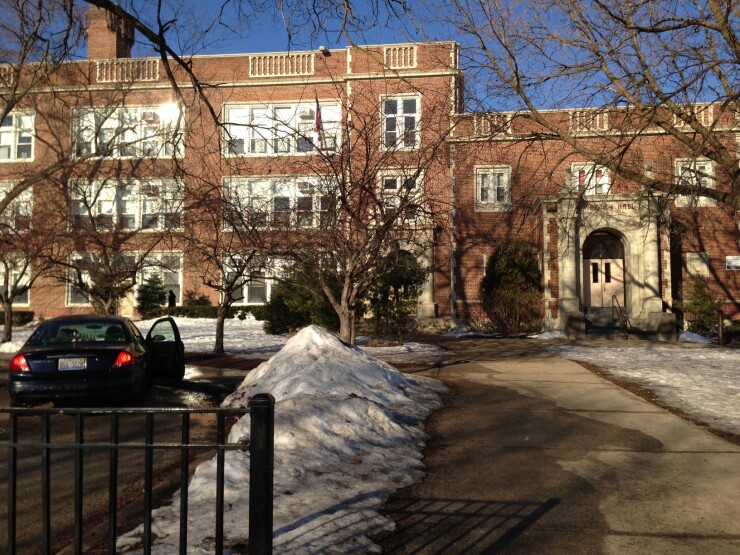The Chicago Public Schools would move to a fully elected school board under legislation approved by the state Senate over the objections of Mayor Lori Lightfoot.
The House previously passed its own version but the House sponsor Tuesday endorsed the
The Chicago Board of Education's seven members are currently appointed by the mayor.

The final version lacked many concessions sought by Lightfoot including a reduction in the number of board members, allowing continued mayoral input through a hybrid governance structure, the imposition of campaign spending limits, and member qualifications. Lightfoot opposes a restriction that doesn’t allow non-citizens to run and wants other qualifications included.
“This is a good compromise that gives the residents of the city of Chicago what they deserve which is a fully elected school board and creates a period of transition to ensure stability,” Martwick said on the Senate floor. “This is a system of democracy where we are entitled to accountability...and nowhere is that more important than in the operation of our schools.”
The bill, in an amendment to House Bill 2908, passed with the supermajority vote of 36-15 with two voting present and six not voting. The bill’s House sponsor Rep. Delia C. Ramirez, D-Chicago, said the amendment accomplishes the bill’s primary goal and will call it for a vote when the House reconvenes.
Lightfoot fought the legislation that had gained steam during the current spring session and put forth her own version that would have left her with control of a majority of nine members. State Sen. Kimberly Lightford, D-Maywood, agreed to sponsor it as an alternative that could help along negotiations on a compromise.
Lightfoot lashed out at the bill Wednesday and stressed she would continue to try to reshape the package.
"We are talking about the most consequential change in governance for the Chicago Public Schools. It can't be about the politics. It's got to be about the people and people that matter most are our children and so we are going to keep making sure that that message get through and resonates and I'm confident we will get to a better place,” Lightfoot said. "There's a lot more work that's going to be done before any" any bill becomes law.
It’s unclear how she can win over lawmakers who have so far ignored her and whether she can influence Gov. J.B. Pritzker, who supports an elected board.
Lightford during the Senate floor debate voiced similar concerns, attacking the rushed nature of the bill’s passage and her exclusion from negotiations during the 11th hour. "What this bill is doing is leaving their parents out,” Lightford said. “We had an opportunity to create a real democracy....this bill is just a little short because it lacked compromise in the last hour...it's not the best we could have done."
Under the bill, in 2025 10 members and a board chair would be appointed by the mayor with City Council approval, and 10 would be elected from 10 districts to be drawn in the city. In November 2026, a fully elected board would be seated with members coming from 20 districts and the chair elected citywide.
The legislation also places a moratorium on school closures until 2025. An advisory commission would represent undocumented residents’ concerns and Martwick said he would consider a future bill to address campaign financing issues.
The Lightfoot administration and Chicago Civic Federation have raised qualms over the city’s continued financial links to the district in the absence of a mayoral role. Chicago is the only Illinois municipality that helps cover non-teacher, school employee pension contributions because they participate in the city’s municipal employees’ fund. Chicago is also the only municipality that provides a dedicated property tax levy for debt service for a separate unit of government.
The city made $124 million in fiscal 2021 pension contributions for school district employees. The district also this year received $142.3 million from a dedicated property tax levy used to pay for some debt service funding, $39.7 million to fund certain CPS capital projects, $12.5 million in grants for programs such as early childhood development, and $96.9 million in city-declared tax increment financing surplus revenues.
The payment method on some of the sources is deeply entrenched either by a levy or through state statute so is not easily unwound although others sources are not. One administration source said it’s not the city’s position that the city should withdraw financial help to the district but said the obligation gives the city a right to hold a long-term seat at the table to protect taxpayers.
Martwick said on the floor that a commission would be established to conduct an independent study "to identify and recommend financial disentanglement for CPS from the city's finances to make sure we do that properly and do have ripple effects.”
Opponents of the proposal also worry about the proposed board’s size and the involvement of special interest funding of election campaigns, with the Chicago Teachers Union seen as likely to wield outsized influence over an elected board. They also note that mayors of most large cities control their schools.
Proponents argue the governance change is long overdue, was supported by Lightfoot during her 2018 campaign, and point to the fact that residents of all other Illinois school districts elect their school boards. Martwick and others also cite a list of contract, ethics and other scandals that led to CEO turnover and landed one in prison.
Three of four rating agencies rate CPS general obligation bonds at junk although the ratings have been on the rise over the last few years due to increased state aid and new city tax levies. CPS operates on a $6.9 billion budget this year and has about $8 billion of debt.





